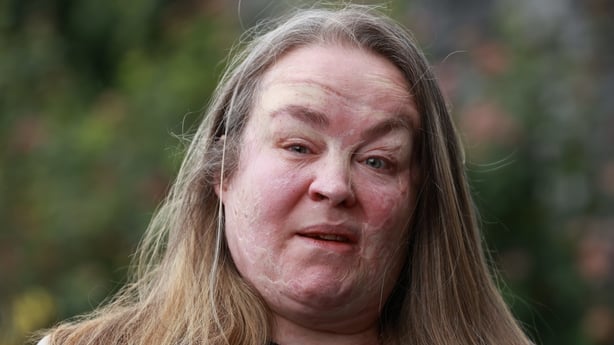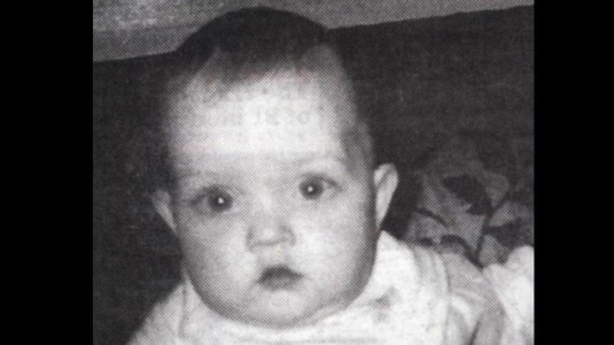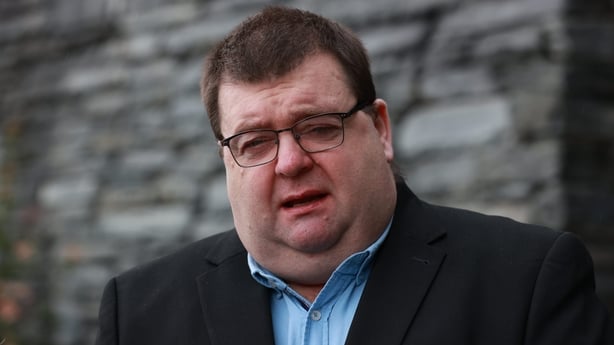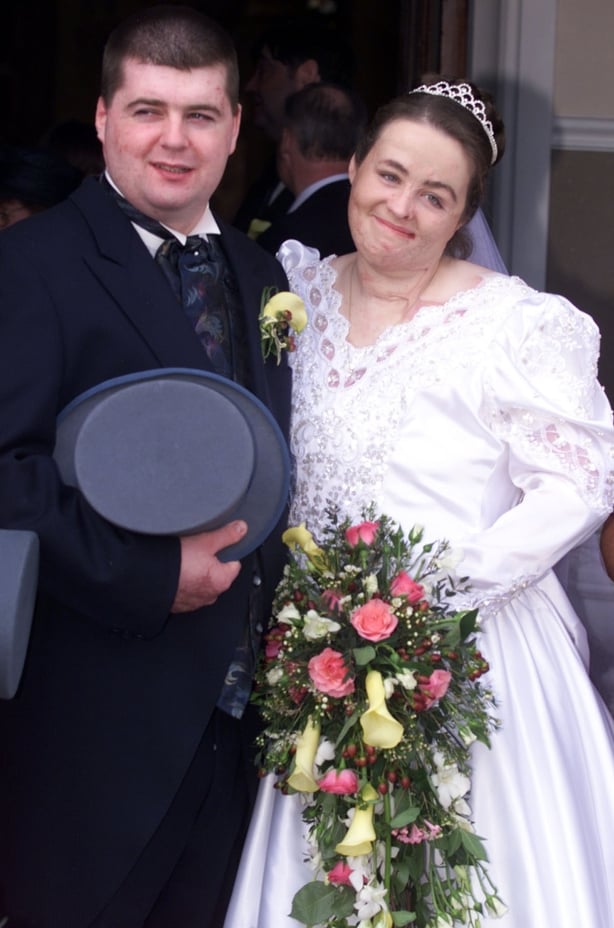A woman who suffered horrific burns in the Omagh bombing has explained how she was given only a 20% chance of survival and was administered the last rites four times in hospital following the explosion.
Donna-Marie McGillion, who was placed into a coma for more than six weeks, said she had believed there would not be a terrorist attack in the town in August 1998 as the Good Friday Agreement had been signed months earlier.
She had been due to get married a week after the Real IRA blast which devastated the centre of the Co Tyrone town.
Ms McGillion eventually married her partner Garry, who was also seriously injured in the explosion, the following year.
The Omagh Bombing Inquiry was told that Ms McGillion’s injuries were so severe that at first her family could only recognise her through her engagement ring.
The inquiry is hearing personal statements from witnesses and people who were injured in the bombing.
It was set up by the UK government to examine whether the explosion, which killed 29 people including the mother of unborn twins, could have been prevented by the authorities.
On the day of the attack, Ms McGillion had travelled into Omagh with her partner, her partner’s sister, Tracy, and his niece, Breda Devine.
They were shopping for shoes for 20-month-old Breda, who was to be flower girl at the wedding.
Ms McGillion told the inquiry that police had moved people to the lower part of the town due to a bomb alert in the afternoon.
She said: "We thought, we had had the Good Friday Agreement, a bomb was never going to go off in Omagh. It was only a (bomb) scare.
"We thought get in, get what we need and get out.
"Looking back on it now, it was a case of, we have the peace process, this is not going to happen, it has passed us now.
"When the (bomb) scare came we thought it was just somebody being silly."

Ms McGillion said she has no memory of the explosion.
She was taken to Omagh Hospital but later airlifted to the Royal Victoria Hospital in Belfast.
"I had a 20% chance of survival when I landed at the Royal," she added.
She was placed in an induced coma for six-and-a-half weeks.
Counsel to the inquiry Paul Greaney read from Ms McGillion’s statement where she said she had received the last rites in hospital on four occasions.
She told the inquiry that she did not know what had happened to her when she was woken up.
"I remember when they brought me round, my mum, who was my strength, and my dad and my two brothers were all around my bed."
Ms McGillion said she believed she had been injured in a car crash but learnt about the Omagh bomb from a news bulletin on the radio.

Her statement said: "The trauma from my time in ICU and the burns unit will always haunt me.
"At times I still feel like I'm back on the ventilators which kept me alive and forced my lungs to breathe in and out.
"I was in extreme pain. It is very hard to explain, like getting burnt by an iron all over your body and multiplying it 200 times over.
"I couldn’t move or lift my hand, I couldn’t even move my face because of the pain. I guess my eyes had to tell others how I was feeling."
She added: "I suffered 65% third-degree burns to my face, upper body front and back, both arms, hands and lower leg.
"I suffered a large laceration to my forehead and shrapnel wounds. I also sustained lung damage and damage to my ear drum.
"After being discharged from hospital, for around three years after I had to wear a plastic mask on my face.
"I had so many different surgeries over the last 26 years that I have lost count."
Ms McGillion said she still lives with daily pain and has had to become used to people staring at her facial scarring.
"Sometimes I wish people would just ask, rather than stare," she said, "I don’t mind saying this is what happened.
"I would rather they ask rather than stare and wonder."
Omagh inquiry: The victims remembered
Reflecting on the tragedy, she told the inquiry: "It is when you go into town and you see people, you know people have lost loved ones and people were injured, you see the pain and you see the hurt.
"It is a regular occurrence, it is there and it is never going away."
She said that when she eventually married Garry - in March 1999 - it was a happy occasion, but that "one person was missing" because Breda had been killed in the explosion.
Ms McGillion said there had been a huge turnout of support from the community on her wedding day.
"It was one of those moments when I was proud to be from Omagh, proud of the people around me.
"The realisation of the support and the network that was around and how everybody really did will for us and wanted us to make this a really good experience for us."
Garry McGillion 'haunted' by guilt over niece's death in attack
Donna-Marie McGillion's husband told the inquiry how he guilt over the death of his niece, Breda, in the bombing has haunted him.
Garry McGillion, who suffered severe injuries, said there had been a "real party atmosphere" in the town centre on the day of the attack.
"It was the start of our life together, a new chapter in both our lives," he said.
Mr McGillion said that his wife was pushing Breda in a pram.
"We had come across the street, speaking to people, people were wishing us the best of luck for the following week.
"I stepped in between the cars, onto the footpath and it was like a massive electric shock.
"When it happened and I got myself back onto my feet it was as if somebody was turning the radio up.
"It started with nothing and then it went to a dull sound and then I could hear alarms going off and then it went to full blast.
"I could hear children shouting for their mums, mums shouting for their children, people shouting for loved ones."
We need your consent to load this rte-player contentWe use rte-player to manage extra content that can set cookies on your device and collect data about your activity. Please review their details and accept them to load the content.Manage Preferences
Mr McGillion said that a cloud of dust had settled over the area.
"The area was dark. You could taste it, you could smell it, you could feel the dust. It was like you had closed your eyes and opened them up to a different world.
"There was a high-pitched squeal in my ears and it wasn’t until I put my hands up I realised my shirt was on fire. I ripped my shirt off.
"I put my hand up to my ear and I realised that I had a hole in the back of my head."
Mr McGillion told the inquiry that he later realised that parts of his body were on fire.
"At that time I didn’t realise how bad it was. My main thought was with Donna-Marie and Breda and Tracy."
He said that he found his wife underneath a large shop sign.
Mr McGillion asked her three times where Breda was, and on the third occasion she moved her hand and it was still on the pram.
He told the inquiry that he managed to move the sign and pull the two of them clear.
"Those images will forever be engraved on my brain. I will not go into the detail of these.
"Trust me, they have haunted me every day and night for the past 26 years."

He said he took Breda into his arms and shouted towards her mother Tracy.
"I told her I had her, I’d got her, I’ll look after her."
He ran up the street and handed Breda over to a traffic warden to receive medical help before attempting to return to the bomb site.
"This was one of the hardest things I have ever had to do in my life.
"Breda was still breathing, I felt her heartbeat but I knew that she needed urgent help.
"I’ve learnt over the past 26 years that you have to make difficult choices, that you will neither like nor want.
"This is one of the most harrowing memories I have.
"As to this day I can still feel Breda’s heartbeat on my chest."
Mr McGillion added: "Holding her, there was the faintest little heartbeat. I knew I had to get her out.
"To this day I still feel that heartbeat."

When he attempted to help his sister and partner, he was told he needed to go to get medical help.
"I remember people carrying bottles of water and pouring bottles of water over me, over my burns.
Mr McGillion was taken to the Royal Victoria Hospital in Belfast. He had suffered third-degree burns to more than a third of the right side of his body and the back of his head.
"The physical pain was hard to describe. It was unbelievable, unbearable."
But he said the worst part was when he was told in hospital that Breda had died.
"I knew something was wrong. My dad came in, my mum came in with the doctors, a lovely priest.
"I thought they were coming to tell me that Donna-Marie had passed away.
"They told me unfortunately that Breda didn’t waken.
"It was like somebody had ripped part of my heart out and that part is still missing today."
He said he has struggled with guilt over the death of Breda and "that is something I will carry with me to the day I die.
"Although it wasn’t my fault, I just feel that I was there to protect her and I couldn’t.
Watch: Omagh bomb inquiry under way
Mr McGillion told the inquiry the first thing he did when he left hospital was to visit Breda’s grave.
"I didn’t get to say goodbye, that was the hardest part. I didn’t get the chance to grieve because I wasn’t there.
"Watching the TV in hospital, the news report came up that it was Breda’s funeral, watching the pain on my dad’s face, on my mum’s face, my younger brothers and sisters, I just felt so guilty."
Mr McGillion added: "Although the explosion of the Omagh bomb changed my life forever, I believe it has made me a stronger person than I ever was.
"This inquiry provides some hope for all those that lost loved ones and survivors, but also the wider community to get the answers that they deserve."

